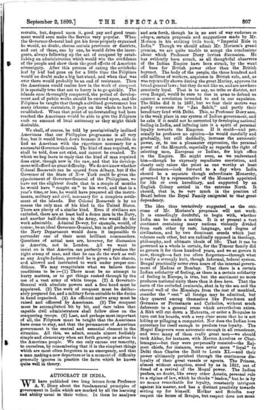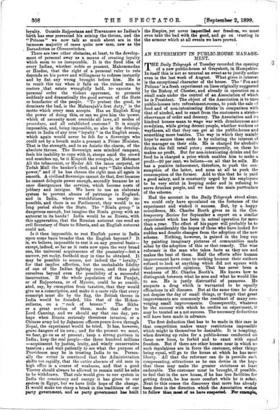AUTOCRACY IN INDIA.
WE have published two long letters from Professor A. V. Dicey about the fundamental principles of government in India which are marked by all the learning and ability usual to their writer. In them he analyses and sets forth, though he in no sort of way endorses ot adopts, certain proposals and suggestions made by Mr. Morison in his striking little book, "Imperial Rule in India." Though we should admit Mr. Morison's grand premiss, we are quite unable to accept the conclusione about which Professor Dicey invites discussion. He has evidently been struck, as all thoughtful observers of the Indian Empire have been struck, by the want of base for British power other than the British bayonet. The body of the people, the three hundred and. odd millions of workers, acquiesce in British rule, and, as was repeatedly shown daring the great Mutiny, approve its broad general laws ; but they do not like us, and nowhere genuinely loyal. That is to say, no tribe or district, not even Bengal, would be sure to rise in arms to defend us against a, revolution intended to end in our expulsion. The Sikhs did it in 1857, but we fear their motive was partly reverence for "Jan Sahib," and partly their hereditary feud with Delhi. This, as Professor Dicey sees, is the weak place in our system of Indian government, and he asks if it could not be corrected by developing national feeling in India, and infusing into it a. spirit of personal loyalty towards the Empress. If it could—and per- sonally he professes no opinion—he would carefully and. gradually, but still decidedly, increase the autocratic power, or, to Use a pleasanter expression, the personal power of the Monarch, especially as regards the right of selecting men, European or Indian, for high office in the Empire. He might even, as we understand him—though he expressly repudiates conviction, and clearly only raises the point as one worthy at least of discussion—look forward to a day when India, should be a separate though subordinate Monarchy, governed by a representative of the Monarch appointed for life or even hereditary, and supported by an English Colony settled in the extreme North. It should, that is, be very much in the position of Brazil before the Royal Family emigrated to that great dependency.
The idea thus tentatively suggested as the mit- come of Mr. Morison's proposals will not work. It is exceedingly doubtful, to begin with, whether India can be made a nation. It is at present a vast continent containing many nations violently divided from each other by race, language, and degree of civilisation, and by two dominant ereeds which just tolerate each other, but are radically opposed in theology, philosophy, and ultimate ideals of life. That it can be governed as a whole is certain, for the Tumour family did so govern it for three hundred years, and we so govern it now, though—a fact too often forgotten—through what is really a strongly knit, though informal, federal system. Bengal practically never even hears of the internal govern- ment of Madras or Bombay. That there is a certain Indian solidarity of feeling, as there is a certain solidarity of feeling in Europe, is true, but the sentiment no more produces national unity there than it does here. That the races of the secluded peninsula, shut in by the sea and the eternal wall of the Himalaya from the rest of mankind, consider the " rest" all foreign may be admitted, but they quarrel among themselves like Frenchmen and Germans or Protestants and Catholics, without much deference to a general sense which nevertheless exists. A Sikh will cut down a Mahratta, or order a Bengalee to turn out his hoards, with a very clear sense that he is not killing or pillaging a compatriot. Nor does the Indian love autocracy for itself enough to produce true loyalty. The Mogul Emperors were autocratic enough in all conscience, and were many of them really great men—we should rank Akbar, for instance, with Marcus Aurelius or Char- lemagne—but they were perpetually resisted—the Raj- poot chiefs, for instance, were never more "loyal" to Delhi than Charles the Bold to Louis XI.—and their power ultimately perished through the continuous dig. loyalty of their great vassals or agents. The Princes, almost without exception, stood by us in 1857, out of dread of a revival of the Mogul power. The Indian prefers, no doubt, like every other Asiatic, personal rule to a regime of law, which he thinks "leaden," but he is by no means remarkable for loyalty, constantly intrigues against his master, and has a distinct proclivity towards getting up for himself. Holkar and Seindia may respect the house of Sivajee, but respect does not mean loyalty. Outside Rajpoota,na and Travancore no Indian's birth has ever prevented his seizing the throne, and the " Princes " we now talk so much about are in the immense majority of cases quite new .men, new as the • Bernadottes or Obrenovitches.
There are two other obstacles, at least, to the develop- ment of personal sway as a means of creating loyalty which seem to us insuperable. It is the fixed idea of every Indian, whether noble or peasant, Mahommedan or Hindoo, that the right of a personal ruler to rule depends on his power and willingness to redress instantly and by fiat any wrong brought before him. He is to remit this tax when it falls on the ruined man, to restore ,that estate wrongfully held, to execute by personal order the violent oppressor, to promote suddenly and dramatically the good servant of the State or benefactor of the people. "To protect the good, to dominate the bad, is the Maharajah's first duty," is the motto which every man accepts. Has an English King the power of doing this, or can we give him the -power, which of necessity must override all laws, all modes of procedure, and all established customs ? It is simply impossible, and, being impossible, so also is the develop- ment in India of aby true "loyalty" in the English sense, which again would never be felt for a Sovereign who could not by a breath make a peasant a Prime Minister. That is the strength, and to an Asiatic the charm, of the absolute throne. The Sovereign sees mischief rampant, feels his inability to cope with it, stoops amid the crowd and snatches up, be it Kiuprili the renegade, or Mehemet Ali the tobacconist, or Hyder Ali the lance corporal, or Todah Mull the banker's clerk, and says "Take absolute power," and if he has chosen the right man all again is smooth. A civilised Sovereign cannot do that, first because he cannot delegate power enough, secondly because he at once disorganises the services, which become nests of jobbery and intrigue. We have to use an elaborate system to prevent abuses of patronage in England, and in India, where watchfulness is nearly im- possible, and there is no Parliament, they would in no long period shake the State. The "Simla group" is dangerous enough, but imagine the Simla group with an autocrat in its hands ! India would be as Russia, with this aggravation, that the Russian autocrat can send an evil Secretary of State to Siberia, and an English autocrat could not.
Is it then impossible. to rest English power in India upon some basis broader than the English bayonet? It is, we believe, impossible to rest it on any general basis— except, indeed, so far as it rests now upon the very broad one, the universal acquiescence of the peasantry—but a narrow, yet rocky, foothold may in time be obtained. It may be possible to secure, not indeed the " loyalty," for that implies affection, but the unshakable fidelity of one of the Indian fighting races, and thus place ourselves beyond even the possibility of a successful insurrection. If the whole population of the Punjab, or of Rajpootana, or of Mysore, could be so concili- ated, say, by exemption from taxation, that they would give us a conscription, and make it a caste rule that every conscript must die by the flag, the British throne in India would be founded, like that of the Hohen- zollerns, on a "rock of bronze." The Sikhs or a great section of *them, made that offer to Lord Canning, and we should say that one day, per- haps when Russia seriously threatens invasion, or a Chinese army led by Japanese officers pours down through Nepal, the experiment would be tried. It.has, however, grave dangers of its own ; and for the present we must, we fear, go on as at present ; keep a strong garrison in India ; keep the real people—the three hundred millions —acquiescent by justice, lenity, and wisely conservative taxation ; and wait patiently to see what the purpose of Providence may be in trusting India to us. Person- ally the writer is convinced that the Administration shifts too rapidly, that the entire absence of old men in high office is a source of weakness, and that a good Viceroy should always be allowed to remain until he asks to be withdrawn. That rule would give to our system in India the consistency and energy it has given to our system in Egypt, but we have little hope of the change. It would make too sharp a break in the traditions of our party government, and as party government has built the Empire, yet never imperilled our freedom, we must even take the bad with the good, and go on trusting in the armour which at all events we have proved.



































 Previous page
Previous page